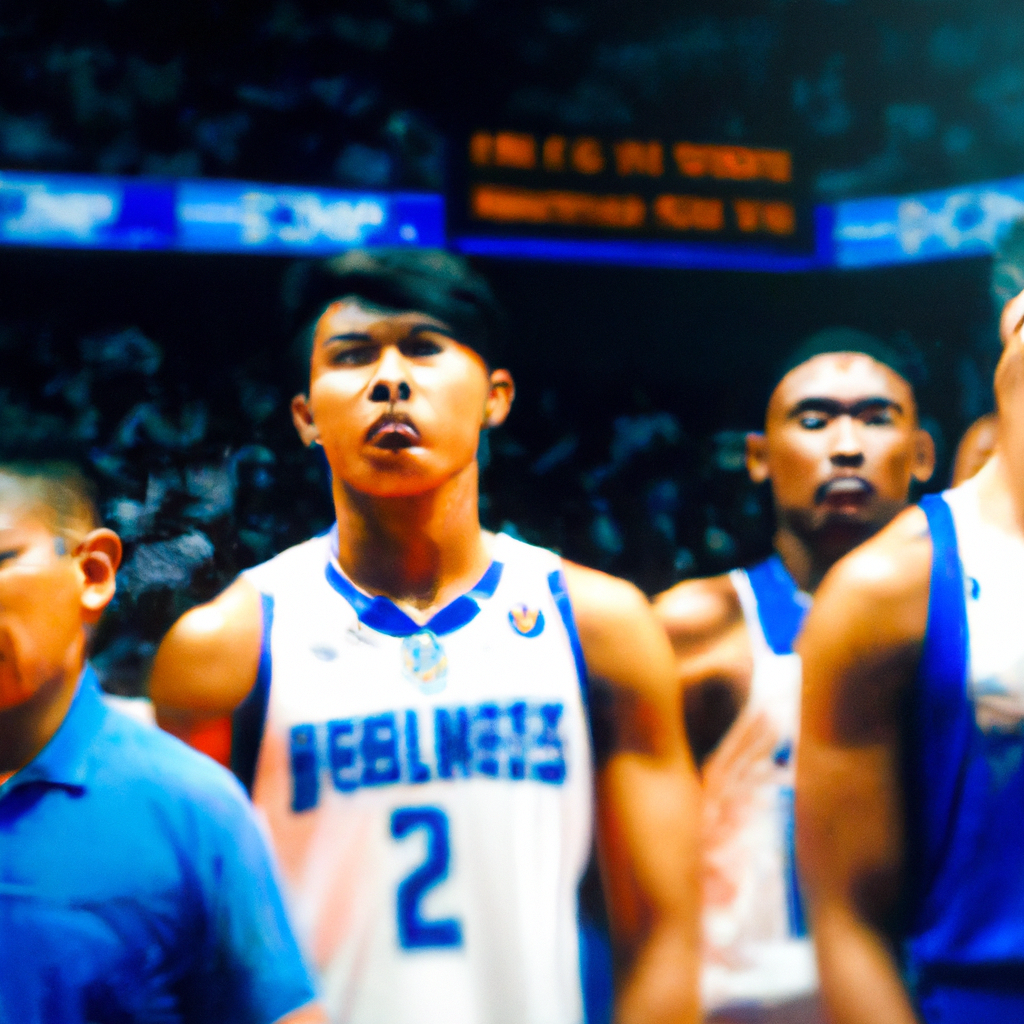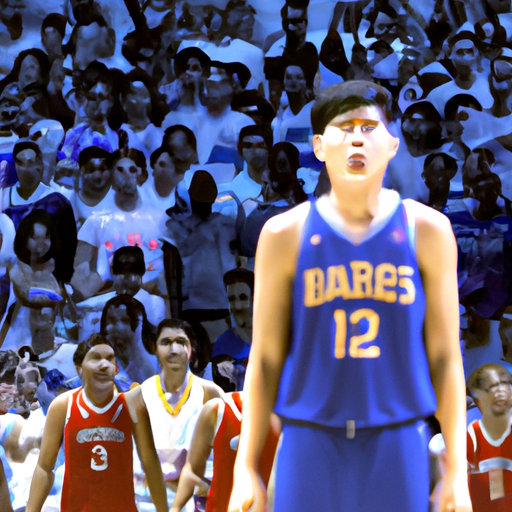Ravena stands by Chot amid boos from frustrated Gilas fans

The Importance of Loyalty in Sports: Ravena’s Support for Chot Reyes
The world of sports is often characterized by intense competition, fierce rivalries, and passionate fans. It is a realm where emotions run high, and the pressure to perform can be overwhelming. In such an environment, loyalty can sometimes be a rare commodity. However, there are instances when individuals rise above the noise and stand firmly by their teammates or coaches, even in the face of adversity. One such example is Kiefer Ravena’s unwavering support for Chot Reyes, despite the boos from frustrated Gilas fans.
Chot Reyes, a renowned basketball coach, has been at the helm of the Philippine national basketball team, Gilas Pilipinas, for several years. Under his guidance, the team has achieved remarkable success, including qualifying for the FIBA World Cup and winning multiple medals in the Southeast Asian Games. However, recent performances have not lived up to expectations, leading to a wave of criticism from fans and pundits alike.
In the midst of this turmoil, Kiefer Ravena, a talented young player and a key member of the Gilas squad, has emerged as a beacon of loyalty. Despite the boos and jeers directed at Reyes, Ravena has publicly expressed his support for the coach, emphasizing the importance of standing by him during challenging times. This display of loyalty is not only commendable but also sheds light on the significance of this virtue in the world of sports.
Loyalty in sports goes beyond mere allegiance to a team or a coach. It is a reflection of the values and principles that athletes hold dear. It is about standing by someone through thick and thin, believing in their abilities, and offering unwavering support. In an era where player transfers and coaching changes are commonplace, loyalty can be a rare and precious commodity.
Ravena’s support for Reyes is a testament to the bond that exists between players and coaches. It is a reminder that success in sports is not solely determined by wins and losses but also by the relationships built within a team. Loyalty fosters trust, unity, and a sense of belonging, all of which are crucial for a team’s success.
Moreover, loyalty in sports extends beyond the confines of the playing field. It resonates with fans and inspires them to remain steadfast in their support. When fans witness a player like Ravena standing by his coach, it reinforces their belief in the team and its values. It reminds them that loyalty is a two-way street, and that their unwavering support is reciprocated by the players and coaches they cheer for.
In a world where social media amplifies criticism and negativity, loyalty becomes even more vital. It serves as a counterbalance to the noise and provides a sense of stability amidst the chaos. When players like Ravena demonstrate loyalty, they set an example for others to follow. They remind us that success is not solely measured by individual achievements but also by the strength of the bonds we forge with those around us.
In conclusion, Kiefer Ravena’s support for Chot Reyes amidst the boos from frustrated Gilas fans highlights the importance of loyalty in sports. Loyalty is not just about standing by a team or a coach; it is a reflection of the values and principles that athletes hold dear. It fosters trust, unity, and a sense of belonging within a team. Moreover, loyalty resonates with fans and inspires them to remain steadfast in their support. In a world where criticism and negativity abound, loyalty serves as a beacon of stability and a reminder of the bonds that hold us together.
Understanding Fan Frustration: Analyzing the Reaction of Gilas Fans

Ravena stands by Chot amid boos from frustrated Gilas fans.
The recent performance of the Philippine national basketball team, Gilas Pilipinas, has left many fans frustrated and disappointed. The team’s lackluster showing in the FIBA Asia Cup qualifiers has led to a wave of criticism and even boos from the crowd. However, amidst the backlash, one player, Kiefer Ravena, has chosen to stand by his coach, Chot Reyes.
Understanding fan frustration is crucial in analyzing the reaction of Gilas fans. The Philippine basketball team has always been a source of national pride, with a passionate fan base that expects nothing less than excellence. The recent string of losses has not only tarnished the team’s reputation but has also left fans questioning the leadership and coaching decisions.
Chot Reyes, the head coach of Gilas Pilipinas, has been at the center of the criticism. Many fans believe that his coaching style and decision-making have contributed to the team’s poor performance. The boos directed at Reyes during games reflect the frustration and disappointment felt by the fans.
However, amidst the negativity, Kiefer Ravena, one of the team’s star players, has chosen to support his coach. Ravena, known for his professionalism and dedication to the sport, understands the challenges faced by the team and believes in the abilities of Coach Reyes. He has publicly defended Reyes, stating that the blame should not solely rest on the coach’s shoulders but should be shared by the entire team.
Ravena’s unwavering support for his coach is commendable, considering the pressure and criticism surrounding the team. It shows his loyalty and belief in the system and the potential for improvement. His stance also highlights the importance of unity and solidarity within the team, especially during challenging times.
The frustration of Gilas fans is understandable. The team’s recent losses have been disappointing, and fans have every right to voice their dissatisfaction. However, it is essential to remember that sports, by nature, are unpredictable. Even the best teams and coaches experience setbacks and failures.
Criticism can be constructive when it is aimed at identifying areas for improvement. However, it becomes counterproductive when it turns into personal attacks and undermines the morale of the team. The boos directed at Coach Reyes may have a detrimental effect on the players’ confidence and overall performance.
Instead of solely blaming the coach, it is crucial to recognize the collective responsibility of the team. Basketball is a team sport, and success or failure is a result of the combined efforts of the players, coaching staff, and management. It is unfair to place the entire burden on one person’s shoulders.
Moving forward, it is essential for Gilas Pilipinas to learn from their recent losses and use them as motivation to improve. The team needs to address the weaknesses and gaps in their game and work towards a more cohesive and effective strategy. This process requires the support and understanding of the fans, who play a significant role in boosting the team’s morale.
In conclusion, the frustration of Gilas fans is a natural reaction to the team’s recent poor performance. However, it is important to approach criticism constructively and avoid personal attacks. Kiefer Ravena’s support for Coach Chot Reyes serves as a reminder of the importance of unity and solidarity within the team. Moving forward, it is crucial for the team to learn from their mistakes and work towards improvement, with the support of their loyal fans.
The Role of Sportsmanship: Examining Ravena’s Actions amidst Criticism
Ravena stands by Chot amid boos from frustrated Gilas fans.
Sportsmanship is a fundamental aspect of any sporting event. It encompasses fair play, respect for opponents, and the ability to handle criticism with grace. In the world of basketball, where emotions often run high, sportsmanship becomes even more crucial. Recently, Kiefer Ravena, a prominent player for the Gilas Pilipinas national basketball team, demonstrated his unwavering commitment to sportsmanship in the face of criticism.
During a recent game, the Gilas Pilipinas team faced a disappointing loss, leaving fans frustrated and disappointed. As the final buzzer sounded, boos echoed throughout the stadium, directed not only at the team but also at their coach, Chot Reyes. It was a difficult moment for everyone involved, but it was Ravena’s response that truly stood out.
Instead of joining in the chorus of boos or showing any signs of frustration, Ravena chose to stand by his coach. He walked over to Reyes, offering a pat on the back and words of encouragement. This simple act spoke volumes about Ravena’s character and his understanding of the role of sportsmanship.
Sportsmanship is not just about winning or losing; it is about how one conducts themselves in the face of adversity. Ravena’s actions demonstrated his ability to rise above the negativity and support his coach, even when the team was facing criticism. It is this kind of attitude that sets a positive example for young athletes and reminds us all of the importance of respect and unity in sports.
Criticism is an inevitable part of any competitive endeavor, and sports are no exception. However, how one responds to criticism is what truly matters. Ravena’s response showed maturity and a deep understanding of the bigger picture. He recognized that his coach, like any human being, is not infallible and can make mistakes. But instead of dwelling on those mistakes, Ravena chose to focus on the bigger goal – the growth and success of the team.
In a world where social media often amplifies negativity, it is refreshing to see athletes like Ravena rise above the noise and remain steadfast in their support for their team and coaches. It is a reminder that sportsmanship is not just a buzzword but a guiding principle that should be upheld by all athletes, regardless of the circumstances.
Ravena’s actions also shed light on the importance of unity within a team. In times of adversity, it is easy for divisions to arise, blame to be assigned, and fingers to be pointed. However, Ravena’s unwavering support for his coach sent a powerful message – that the team stands together, united in their pursuit of success.
Sportsmanship is not just about how one behaves on the court; it extends beyond the game itself. It is about how one carries themselves off the court, how they treat their opponents, and how they handle criticism. Ravena’s actions exemplify the true spirit of sportsmanship, reminding us all that it is not just about winning but about the values we uphold as athletes and as human beings.
In conclusion, Kiefer Ravena’s actions amidst the boos from frustrated Gilas fans serve as a powerful reminder of the role of sportsmanship in the world of basketball. His unwavering support for his coach, Chot Reyes, and his ability to rise above the negativity demonstrate his maturity and understanding of the bigger picture. Ravena’s actions set a positive example for young athletes and remind us all of the importance of respect, unity, and grace in the face of criticism.

